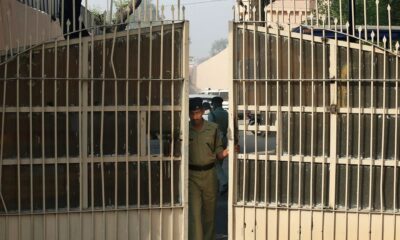Science & Technology
Hopes are high for local sports car to go on display at Geneva International Motor Show

Mechanical engineers at Afghansitan’s Technical Vocational Education and Training (TVET) center said a locally built “racing car” will hopefully go on display at the Geneva International Motor Show in Qatar next year.
According to a social media post by one of the engineers, Sami Samaruden, the car was built with limited resources.
He said the Embassy of Qatar is helping to arrange for the car to go on display at the global motoring extravaganza in October next year.
According to TVET, all components, except for the car’s engine, have been designed and made in Afghanistan.
Ghulam Haidar Shahamat, head of Technical and Vocational Education Training Department of the Islamic Emirate says that he discussed the possibility of exhibiting the car at the international motor show, that will take place in Doha, in a meeting with the Qatari ambassador.
According to Shahamat, Qatari diplomats assured TVET of their cooperation.
The Geneva International Motor Show Qatar is set to take place from 5 to 14 October 2023 in Doha.
Science & Technology
Iran lifts ban on WhatsApp and Google Play, state media says
Social media platforms were widely used in anti-government protests in Iran.

Iranian authorities have lifted a ban on Meta's instant messaging platform WhatsApp and Google Play as a first step to scale back internet restrictions, Iranian state media reported on Tuesday.
The Islamic Republic has some of the strictest controls on Internet access in the world, but its blocks on U.S.-based social media such as Facebook, Twitter and YouTube are routinely bypassed by tech-savvy Iranians using virtual private networks, Reuters reported.
"A positive majority vote has been reached to lift limitations on access to some popular foreign platforms such as WhatsApp and Google Play", Iran's official IRNA news agency said on Tuesday, referring to a meeting on the matter headed by President Masoud Pezeshkian.
"Today the first step in removing internet limitations... has been taken," IRNA cited Iran's Minister of Information and Communications Technology Sattar Hashemi as saying.
Social media platforms were widely used in anti-government protests in Iran.
Science & Technology
Trump says it could be worth keeping TikTok in US for a little while
Trump met with TikTok’s CEO on Monday. Trump said at a news conference the same day that he had a “warm spot” for TikTok thanks to his campaign’s success on the app.

President-elect Donald Trump indicated on Sunday that he favored allowing TikTok to keep operating in the United States for at least a little while, saying he had received billions of views on the social media platform during his presidential campaign, Reuters reported.
Trump's comments before a crowd of conservative supporters in Phoenix, Arizona, were one of the strongest signals yet that he opposes a potential exit of TikTok from the U.S. market.
The U.S. Senate passed a law in April requiring TikTok's Chinese parent company, ByteDance, to divest the app, citing national security concerns.
TikTok's owners have sought to have the law struck down, and the U.S. Supreme Court has agreed to hear the case. But if the court does not rule in ByteDance's favor and no divestment occurs, the app could be effectively banned in the United States on Jan. 19, one day before Trump takes office.
It is unclear how Trump would go about undoing the TikTok divestiture order, which passed overwhelmingly in the Senate, read the report.
"I think we're going to have to start thinking because, you know, we did go on TikTok, and we had a great response with billions of views, billions and billions of views," Trump told the crowd at AmericaFest, an annual gathering organized by conservative group Turning Point.
"They brought me a chart, and it was a record, and it was so beautiful to see, and as I looked at it, I said, 'Maybe we gotta keep this sucker around for a little while'," he said.
Trump met with TikTok's CEO on Monday. Trump said at a news conference the same day that he had a "warm spot" for TikTok thanks to his campaign's success on the app.
The Justice Department has argued that Chinese control of TikTok poses a continuing threat to national security, a position supported by most U.S. lawmakers, Reuters reported.
TikTok says the Justice Department has misstated the social media app's ties to China, arguing that its content recommendation engine and user data are stored in the United States on cloud servers operated by Oracle Corp (ORCL.N), opens new tab, while content moderation decisions that affect U.S. users are made in the United States.
Science & Technology
Albania bans TikTok for a year after killing of teenager

Albania on Saturday announced a one-year ban on TikTok, the popular short video app, following the killing of a teenager last month that raised fears over the influence of social media on children.
The ban, part of a broader plan to make schools safer, will come into effect early next year, Prime Minister Edi Rama said after meeting with parents' groups and teachers from across the country, Reuters reported.
"For one year, we'll be completely shutting it down for everyone. There will be no TikTok in Albania," Rama said.
Several European countries including France, Germany and Belgium have enforced restrictions on social media use for children. In one of the world's toughest regulations targeting Big Tech, Australia approved in November a complete social media ban for children under 16.
Rama has blamed social media, and TikTok in particular, for fuelling violence among youth in and outside school.
His government's decision comes after a 14-year-old schoolboy was stabbed to death in November by a fellow pupil. Local media had reported that the incident followed arguments between the two boys on social media. Videos had also emerged on TikTok of minors supporting the killing.
"The problem today is not our children, the problem today is us, the problem today is our society, the problem today is TikTok and all the others that are taking our children hostage," Rama said.
TikTok said it was seeking "urgent clarity" from the Albanian government.
"We found no evidence that the perpetrator or victim had TikTok accounts, and multiple reports have in fact confirmed videos leading up to this incident were being posted on another platform, not TikTok," a company spokesperson said.
-

 Sport5 days ago
Sport5 days agoAfghanistan clinches ODI series victory against Zimbabwe
-

 Business4 days ago
Business4 days agoShoemaking industry in Takhar province facing stagnation
-

 Latest News4 days ago
Latest News4 days agoA new polio vaccination campaign is set to launch in Afghanistan
-

 Latest News4 days ago
Latest News4 days agoEight Afghan migrants die as boat capsizes off Greek island
-

 Latest News2 days ago
Latest News2 days agoOver 50 Afghan inmates freed from Pakistani prisons
-

 Latest News5 days ago
Latest News5 days agoG7 envoys urge national dialogue for lasting stability in Afghanistan
-

 Science & Technology4 days ago
Science & Technology4 days agoAlbania bans TikTok for a year after killing of teenager
-

 World4 days ago
World4 days agoMore than 30 dead in Brazil bus and truck collision
























